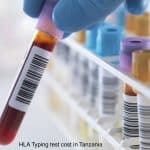What is HLA Typing test?
HLA typing, or Human Leukocyte Antigen typing, is a test that identifies specific proteins called human leukocyte antigens on the surface of cells. These antigens play a crucial role in the immune system, particularly in distinguishing between self and non-self cells.
The HLA system is a complex set of genes located on chromosome 6, and it encodes for proteins that are vital for the regulation of the immune response. The primary purpose of HLA typing is to assess the compatibility of tissues, especially in the context of organ or tissue transplantation.
HLA typing is essential in the following situations:
- Organ Transplantation: Matching HLA types between the donor and recipient is critical to minimize the risk of rejection and improve the success of organ transplants.
- Blood Transfusion: HLA typing helps in identifying compatible blood for transfusions, reducing the risk of adverse reactions.
- Autoimmune Diseases: Certain autoimmune disorders, like rheumatoid arthritis or celiac disease, are associated with specific HLA types. HLA typing can aid in diagnosing and understanding these conditions.
- Disease Susceptibility: HLA typing is used in research to investigate associations between certain HLA types and susceptibility to various diseases, including autoimmune conditions.







